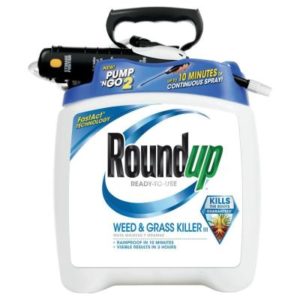 Glyphosate (found in Roundup and Ranger Pro) is the most heavily used herbicide (weed-killer) in the world, and its use has been steadily increasing in the past decade. The debate over whether the pesticide is carcinogenic (cancer-causing) or not has been going on for a while.
Glyphosate (found in Roundup and Ranger Pro) is the most heavily used herbicide (weed-killer) in the world, and its use has been steadily increasing in the past decade. The debate over whether the pesticide is carcinogenic (cancer-causing) or not has been going on for a while.
This week University of Washington researchers published a study that analyzed earlier studies about glyphosate herbicides (such as Roundup). They found that persons with higher exposure to glyphosate have a 41% increased chance of getting cancer, specifically non-Hodgkin lymphoma (NHL). This is huge. Of course, the manufacturer of Roundup (Monsanto and its owner Bayer) is going nuts trying to discredit the study, but the scientific evidence is clear.
Unfortunately many foods contain residues of glyphosate, the amounts found in foods are increasing, and as a consequence most of us (even pregnant women) have detectable levels of glyphosate in our bodies.
How to lower your exposure to Roundup or other glyphosate based herbicides? Don't use Roundup or other glyphosate-based herbicides in your yard or property. Try to eat as much organic food as possible. Glyphosate is NOT allowed to be used in organic farming.
Glyphosate residues are increasingly found in conventionally grown foods and in increasing amounts because so many crops grown are now "Roundup Ready" (can withstand the herbicide), and also due to preharvest (right before harvest) application of the herbicide on regular crops.
By the way, the US government is resisting testing for glyphosate residues in foods because of their insistence that it is "safe", so why test? (due to industry influence...)
The researchers of this study also mention research showing that glyphosate alters the gut microbiome, and that it may act as an endocrine disrupting chemical. In other words, there are a number of health concerns with glyphosate herbicides.
Excerpts from investigative journalist Carey Gillam's article in The Guardian: Weedkiller 'raises risk of non-Hodgkin lymphoma by 41%'
A broad new scientific analysis of the cancer-causing potential of glyphosate herbicides, the most widely used weedkilling products in the world, has found that people with high exposures to the popular pesticides have a 41% increased risk of developing a type of cancer called non-Hodgkin lymphoma.
The evidence “supports a compelling link” between exposures to glyphosate-based herbicides and increased risk for non-Hodgkin lymphoma (NHL), the authors concluded, though they said the specific numerical risk estimates should be interpreted with caution.
The findings by five US scientists contradict the US Environmental Protection Agency’s (EPA) assurances of safety over the weed killer and come as regulators in several countries consider limiting the use of glyphosate-based products in farming.
Sheppard was one of the scientific advisers to the EPA on glyphosate and was among a group of those advisers who told the EPA that it failed to follow proper scientific protocols in determining that glyphosate was not likely to cause cancer. “It was wrong,” Sheppard said of the EPA glyphosate assessment. “It was pretty obvious they didn’t follow their own rules. “Is there evidence that it is carcinogenic? The answer is yes.”
The study authors said their new meta-analysis evaluated all published human studies, including a 2018 updated government-funded study known as the Agricultural Health Study (AHS). Monsanto has cited the updated AHS study as proving that there is no tie between glyphosate and NHL. In conducting the new meta-analysis, the researchers said they focused on the highest exposed group in each study because those individuals would be most likely to have an elevated risk if in fact glyphosate herbicides cause NHL.
Looking only at individuals with real-world high exposures to the pesticide makes it is less likely that confounding factors may skew results, the authors said. In essence – if there is no true connection between the chemical and cancer then even highly exposed individuals should not develop cancer at significant rates.
In addition to looking at the human studies, the researchers also looked at other types of glyphosate studies, including many conducted on animals. “Together, all of the meta-analyses conducted to date, including our own, consistently report the same key finding: exposure to GBHs are associated with an increased risk of NHL,” the scientists concluded.
